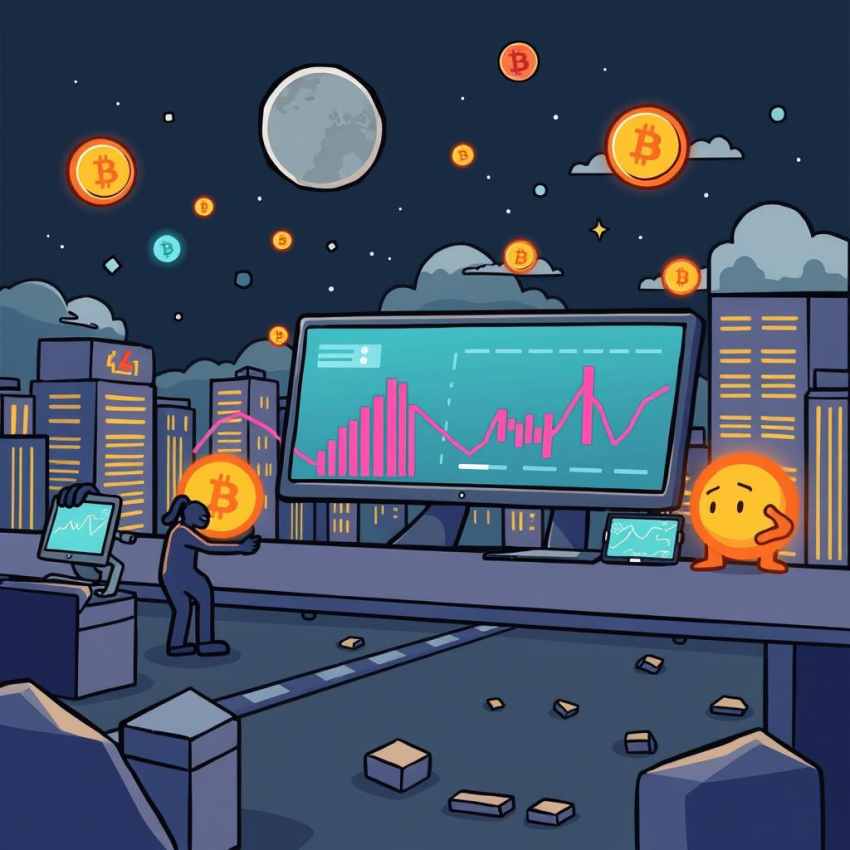Understanding Centralized and Decentralized Exchanges: A Comprehensive Analysis
In this article, we have completely compared between centralized exchanges (CEX) and decentralized exchanges (DEX) and examined the strengths and weaknesses of each. A complete guide
Understanding Centralized and Decentralized Exchanges: A Comprehensive Analysis
In the dynamic world of cryptocurrencies, exchanges are essential for trading and liquidity. Two major types of exchanges are centralized exchanges (CEX) and decentralized exchanges (DEX).
Each type has unique ways of operating and differing levels of security. This article explores these differences in detail. It will look at security features, transaction fees, and user feedback, providing insights into overall satisfaction within the cryptocurrency community.
Centralized and Decentralized Exchanges
1.1 Centralized Exchanges (CEX)

Centralized exchanges serve as intermediaries in the trading process. They manage transactions and facilitate trading between users through a single, central system.
Examples of well-known CEX platforms include Coinbase, Binance, and Kraken. These exchanges have a governing body that oversees all operations. They handle user accounts and manage liquidity, making the trading experience more streamlined for users.
Users typically deposit their cryptocurrency into the exchange, allowing the platform to act on their behalf. This setup can lead to faster transactions, but it also raises concerns about security and control over funds.
also see : Comprehensive review and step-by-step introduction of the best cryptocurrency exchanges in 2025
1.2 Decentralized Exchanges (DEX)
Decentralized exchanges operate differently. They do not use an intermediary, allowing users to trade directly with one another through smart contracts on blockchain technology.
Platforms like Uniswap, SushiSwap, and PancakeSwap are well-known examples of DEX. These exchanges provide users with greater control over their assets.
Transactions happen directly on the blockchain, making it more difficult for any single entity to manipulate or control the trade. DEXs also typically have lower fees since they eliminate many costs associated with centralized operations.
However, users must be more cautious, as they are responsible for their own wallets and security. This self-custody can be an advantage or disadvantage, depending on the user’s knowledge and experience.
In conclusion, understanding the difference between centralized and decentralized exchanges is crucial for cryptocurrency users. Each type has its strengths and weaknesses, and user preferences vary based on factors like security, fees, and control over assets. By evaluating these elements, users can make informed decisions that align with their trading goals.
Key Differences Between Centralized and Decentralized Exchanges
2.1 Security
Centralized Exchanges (CEXs) often attract hackers because they store user funds and sensitive information in one place. This centralization makes them prime targets.
When security breaches occur, the financial impact can be severe. For example, the infamous Mt. Gox hack in 2014 resulted in the loss of approximately 850,000 BTC. To combat these security threats, CEXs employ various protective measures.
Many exchanges implement two-factor authentication (2FA) to add an extra layer of security. Additionally, they use cold storage to keep most of the funds offline, away from potential attacks.
Some may even have insurance policies in place to cover losses. Despite these precautions, the inherent risks of centralization persist, leaving users vulnerable.
In contrast, Decentralized Exchanges (DEXs) utilize blockchain technology, which offers a more secure framework. Users have control of their private keys, thereby reducing the risk of hacks.
This ownership greatly diminishes the chances of large-scale losses due to hacking. However, DEXs are not without their own risks. Smart contracts, which power these exchanges, can have vulnerabilities.
If exploited, these weaknesses can lead to significant financial losses for users. A notable example is the Poly Network hack in 2021, which highlighted how DEXs can still face unique security challenges even while mitigating some traditional risks found in CEXs.
2.2 Fees
The fee structure of Centralized Exchanges is generally straightforward. CEXs typically charge trading fees ranging from 0.1% to 1% of each transaction. Beyond trading fees, users must consider withdrawal fees, which apply when transferring assets out of the exchange.
Some CEXs do offer discounts for users who trade at higher volumes or hold certain native tokens. Despite these options, frequent traders may find that cumulative fees can become quite substantial, impacting their overall profitability.
Decentralized Exchanges often offer a more attractive fee structure. Overall, DEXs tend to charge lower fees than centralized platforms. This reduction is primarily due to their lower operational costs.
However, users need to be cautious about gas fees, particularly on networks like Ethereum. These fees can spike significantly during times of heavy network congestion, which may erase any savings from lower trading fees.
Nonetheless, many traders find the generally lower fees on DEXs appealing, especially when executing smaller transactions.
2.3 User Experience
Centralized Exchanges are designed with user experience in mind. They offer intuitive interfaces and strong customer support, which makes them particularly appealing for those new to cryptocurrency trading.
CEXs provide various trading tools, including real-time charts, alerts, and educational resources. These features cater to traders of all skill levels, making the trading process smoother and more accessible.
In contrast, the user experience on Decentralized Exchanges can be more challenging. New users may face a steep learning curve, as they need to integrate wallets and understand the technical aspects of cryptocurrency.
While DEX interfaces have improved over time, using these platforms still requires a certain level of tech-savviness. This complexity can discourage users who are less familiar with the technology, making them feel overwhelmed compared to the simpler experience offered by CEXs.
3-Customer Feedback and Satisfaction
Social media has become an essential tool for assessing user satisfaction with both centralized and decentralized exchanges. Platforms such as Twitter, Reddit, and niche forums provide a wealth of information about customer experiences.
These discussions help identify the advantages and disadvantages of each exchange type, giving potential users valuable insights.
3.1-Customer Sentiment on Centralized Exchanges
Feedback about centralized exchanges (CEXs) varies significantly among users. Some individuals commend these platforms for their quick transaction times and extensive selection of cryptocurrencies. The appeal of being able to quickly buy or sell various coins often attracts users to CEXs.
However, not all experiences are positive. Many users share their frustrations with issues such as account freezes, limits on withdrawals, and concerns surrounding security breaches.
The trade-off for convenience is often a lack of control, which can lead to dissatisfaction. On forums like Reddit, users frequently discuss these concerns. The emphasis on the need for transparency and greater user control emerges continually in these conversations.
3.2-Customer Sentiment on Decentralized Exchanges
On the other hand, decentralized exchanges (DEXs) receive positive feedback for their focus on security and user autonomy. Many users appreciate the ability to trade directly without involving a third party. This independence appeals to those who prioritize control over their transactions.
However, feedback also highlights certain issues with DEXs. Many users encounter challenges due to their complexity and possible delays caused by congestion on the blockchain.
Discussions on platforms like Twitter often reveal a growing enthusiasm for DEXs, especially following high-profile security incidents involving centralized exchanges. Users seem increasingly inclined to explore options that prioritize their safety and control.
4. Which is Better: Centralized or Decentralized Exchanges?
When considering which type of exchange, centralized or decentralized, is better, one must evaluate their personal preferences and priorities. Each exchange type has its strengths and weaknesses that can influence a trader's experience.
Centralized Exchanges:
Centralized exchanges are known for being user-friendly. They often come with intuitive interfaces that make trading easy for newcomers. These platforms also provide extensive customer support, which can be crucial for those who need assistance.
Additionally, centralized exchanges usually have high trading volumes, allowing for better liquidity and potentially quicker transactions.
However, there are downsides to centralized exchanges. They can be vulnerable to hacks, which have led to significant losses for users in the past. Traders also have limited control over their funds, as these exchanges hold users' assets.
This can create a sense of risk and dependency on the platform’s security. Lastly, centralized exchanges often charge high fees for transactions, which can eat into profits.
Decentralized Exchanges (DEX):

On the other hand, decentralized exchanges offer distinct advantages. Users enjoy greater control over their funds since they retain their private keys and do not have to trust a third party with their assets.
Additionally, decentralized exchanges often enhance privacy, as they typically require less personal information during the trading process. Fees on these platforms can also be lower, making trading more cost-effective for many individuals.
Despite these benefits, decentralized exchanges are not without their challenges. The user interfaces can be complex, which may frustrate less experienced traders.
Moreover, decentralized exchanges rely on smart contracts, which can have vulnerabilities that may expose users to risks. The learning curve may deter some traders from fully engaging with these platforms.
In summary, the choice between centralized and decentralized exchanges ultimately rests on the trader's needs. Understanding the pros and cons is essential for making an informed decision that aligns with individual trading goals and comfort levels in managing risk.
Final Thoughts
In the wider scope of the cryptocurrency ecosystem, both centralized and decentralized exchanges cater to diverse preferences. Users valuing convenience and support may gravitate toward CEXs, while those prioritizing security and autonomy may prefer DEXs.
References for Further Reading
Rhoads, T. (2021). “Understanding the Differences Between Centralized and Decentralized Exchanges.” CoinDesk. [link] Courtois, N. T. (2021). “Decentralized Exchanges: An Overview of their Security and Impact on the Market.” Journal of Blockchain Research. [link] Twitter User Feedback on DEXs and CEXs on CryptoCommunity. Reddit Discussion Threads on C entralized vs. Decentralized Exchanges. Coinbase and Binance Customer Reviews on Trustpilot.
In conclusion,In understanding centralized and decentralized exchanges, it is clear that each serves different needs within the cryptocurrency market. Centralized exchanges offer user-friendly services, quicker transactions, and robust customer support, making them ideal for beginners.
However, they come with risks related to security and control over funds. On the other hand, decentralized exchanges provide greater security, lower fees, and more control for experienced users, though they may require a deeper understanding of technology.
Ultimately, the choice between CEXs and DEXs depends on personal preferences and trading goals. Consider your priorities carefully and make informed decisions that align with your trading style. Explore your options today to find the exchange that best fits your needs.









1 Comments
Amouri88
2024-01-09T10:41
Nice post